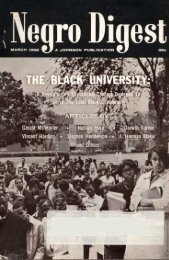3. Strain, Christopher Barry. “Civil Rights and ... - Freedom Archives
3. Strain, Christopher Barry. “Civil Rights and ... - Freedom Archives
3. Strain, Christopher Barry. “Civil Rights and ... - Freedom Archives
You also want an ePaper? Increase the reach of your titles
YUMPU automatically turns print PDFs into web optimized ePapers that Google loves.
precluded him from being involved. The movement, which seemed to Malcolm to be under<br />
King's direction, was a self-described "nonviolent movement," <strong>and</strong> Malcolm was self-<br />
avowedly "not nonviolent ."<br />
Third, <strong>and</strong> perhaps most importantly, he saw his role as that of a critic . He worked<br />
better by offering a searing counterpoint to the comparatively mainstream viewpoints offered<br />
by King <strong>and</strong> others, <strong>and</strong> he knew that this was where his strength lay : as a commentator,<br />
rather than as a direct participant . He often referred to "them Uncle Toms," meaning the<br />
mainstays of the SCLC, NAACP, <strong>and</strong> Urban League : Martin Luther King, Roy Wilkins, <strong>and</strong><br />
Whitney Young . In turn, the mainstream civil rights leadership ostracized Malcolm . Indeed,<br />
he existed on the periphery of the movement like dark storm clouds, building . His anger<br />
grew, <strong>and</strong> with it, the impetus to effect change immediately.<br />
Like King <strong>and</strong> Robert Williams, Martin Luther King <strong>and</strong> Malcolm X freely attacked<br />
one another without seeming to underst<strong>and</strong> fully the other's position . While they met in<br />
person only once, they responded <strong>and</strong> challenged one another-sometimes by name,<br />
sometimes in veiled references-throughout their public lives . King was invariably more<br />
magnanimous with Malcolm than the other way around . Malcolm called nonviolence<br />
"foolish ."~2 On different occasions, he referred to Dr. King as "an Uncle Tom," <strong>and</strong> "a<br />
chump not achamp:' "Coffee with a cracker," he scoffed, "that's success ?' .~3 Malcolm X<br />
1962 ; however, the following year Muhammad instructed Malcolm not to help orjoin in any<br />
demonstrations sponsored by the various civil rights organizations--including the upcoming<br />
March on Washington . See Davis, Malcolm X: The Great Photoara~hs , 55, 92.<br />
4~"Malcolm X Disputes Nonviolence Policy," New York Times (June S, 1963) : 29 .<br />
43Goldman, Death <strong>and</strong> Life of Malcolm X, 75,101 .<br />
101
















